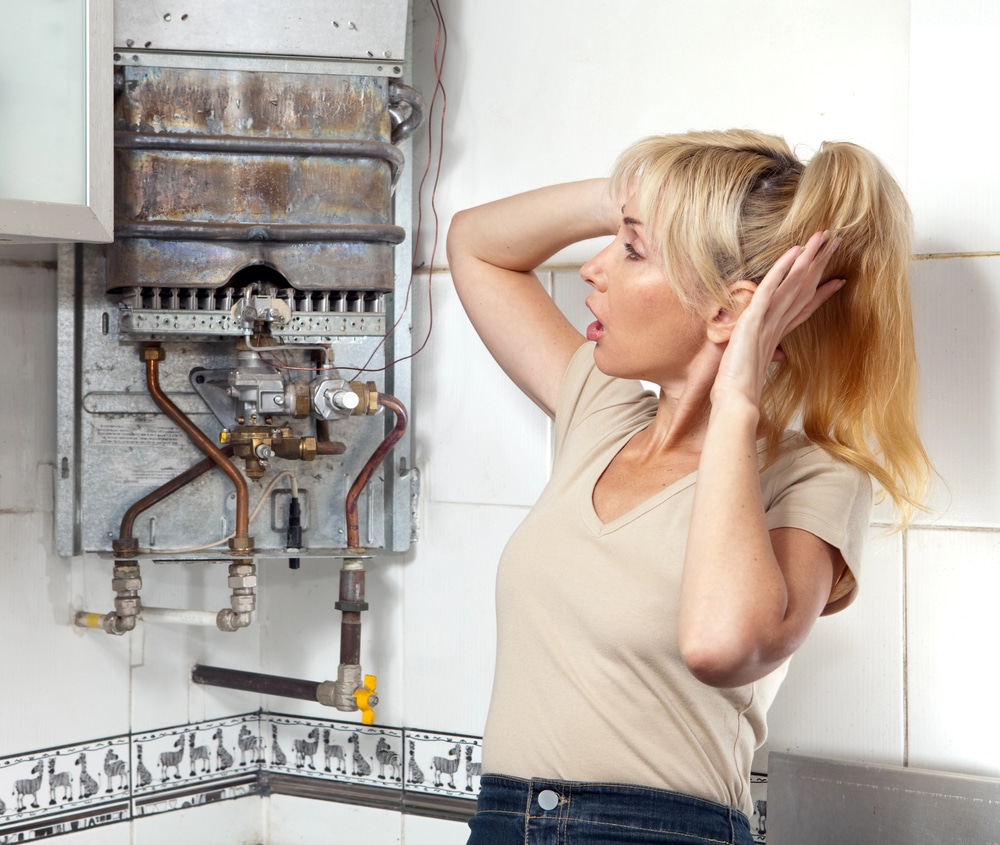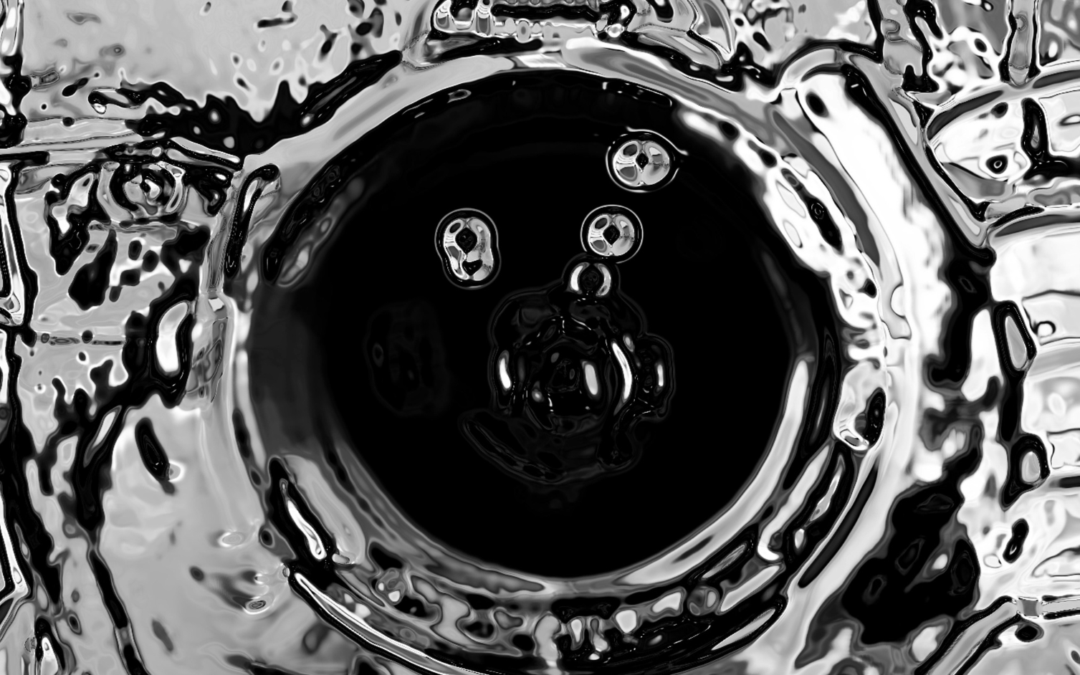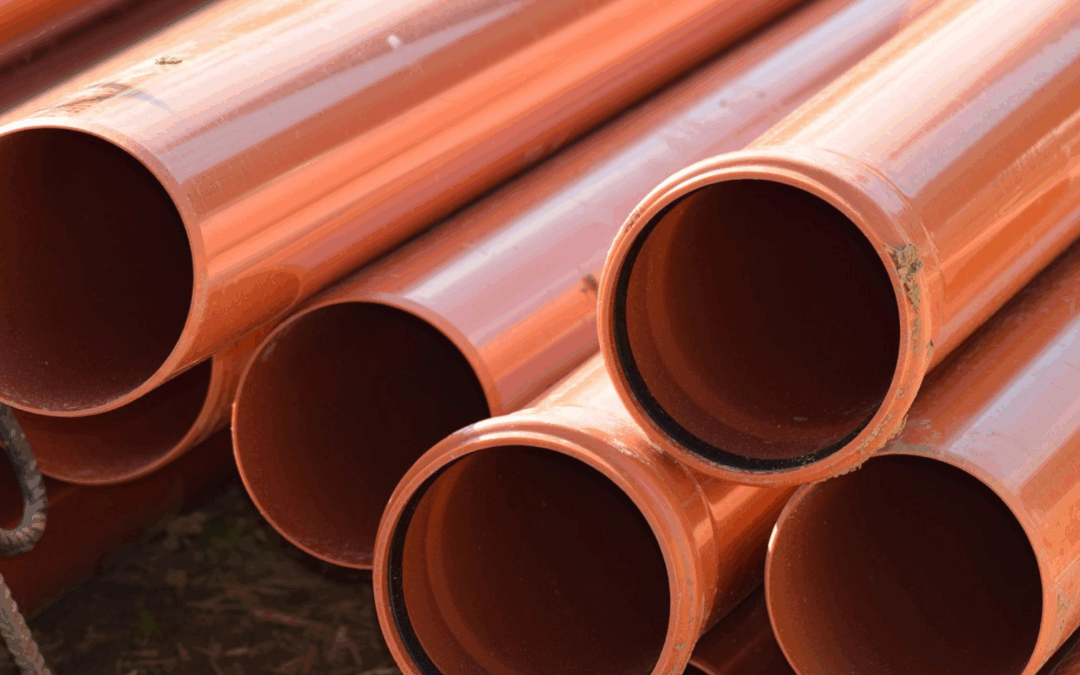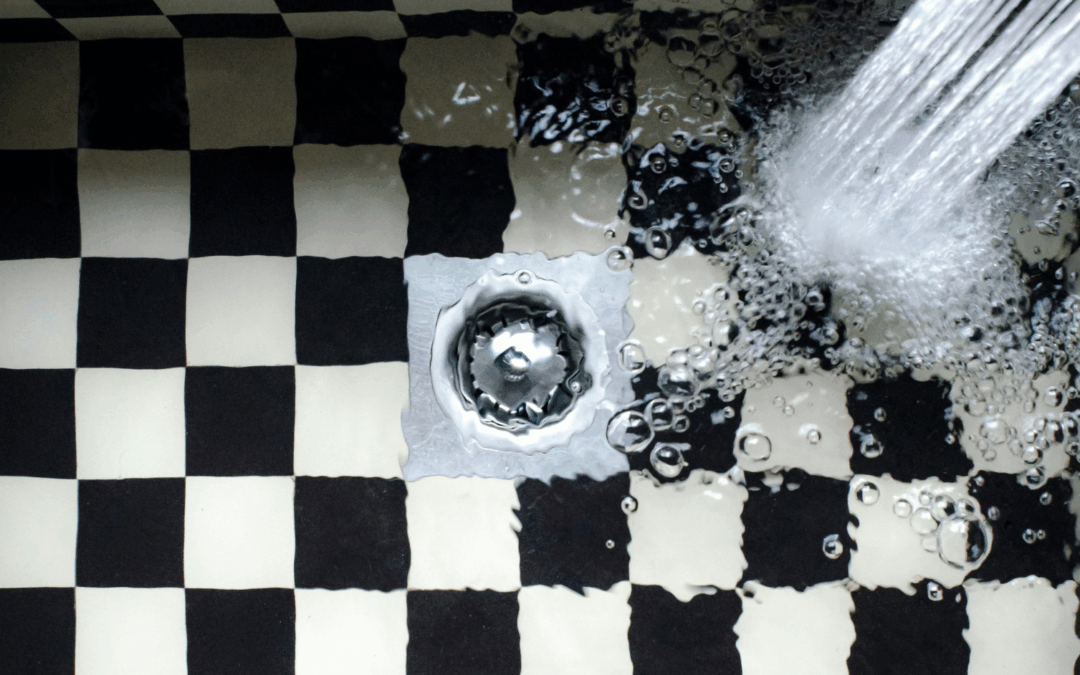Is your gas water heater not working properly? It’s easy to take a gas water heater for granted – it’s a silent workhorse of the home, providing comforting warmth to your showers and cleaning routines. Until, of course, something goes wrong. For homeowners, the sudden disruption of hot water is more than an inconvenience; it’s often a sign that the water heater requires attention.
This listicle is designed to empower you to detect early signs of trouble with your gas water heater, understand the potential issues, and even troubleshoot some problems yourself.
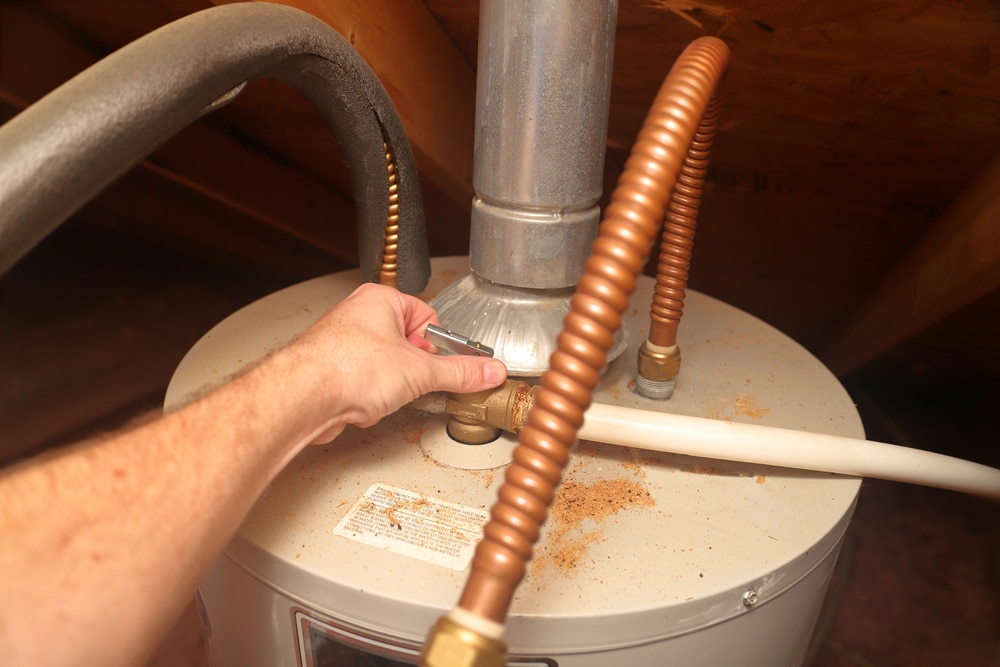
Water Heater – hand releases T&P safety Relief Valve on a home water heater
What is a Gas Water Heater?
A gas water heater is a device that utilizes natural gas or propane to heat water for residential use. It operates by drawing gas from a supply line, which is then ignited in a combustion chamber. This process heats a water tank, transferring warmth to the water inside.
Schedule Service Online
Get a free estimate so you know what you're signing up for
"*" indicates required fields
For Emergency Services Call: 410-255-9300
Gas hot water heaters are preferred by many for their efficiency and ability to rapidly heat water compared to electric models. They are available in various sizes and configurations, including tankless versions that provide hot water on demand.
Understanding how your gas hot water heater functions can help you better maintain it and recognize when it may need repairs.
Difference between Gas Water Heaters and Electric Water Heaters
When deciding between a gas water heater and an electric water heater, it’s essential to understand their key differences, as each has its advantages and drawbacks.
Gas hot water heaters are known for their rapid heating capability and cost-efficiency in areas where gas is more affordable than electricity. They use a combustion process to heat water, which can be more efficient than electrical resistance heating used by electric water heaters.
On the other hand, an electric hot water heater offer the benefits of easier installation and a smaller physical footprint since they don’t require venting for combustion gases.
However, electric models may have higher operational costs in regions where electricity is pricier than natural gas or propane, and they typically heat water at a slower rate than their gas counterparts.
Choosing between gas and electric water heaters ultimately depends on the availability of utilities in your area, initial installation costs, and long-term energy consumption considerations.
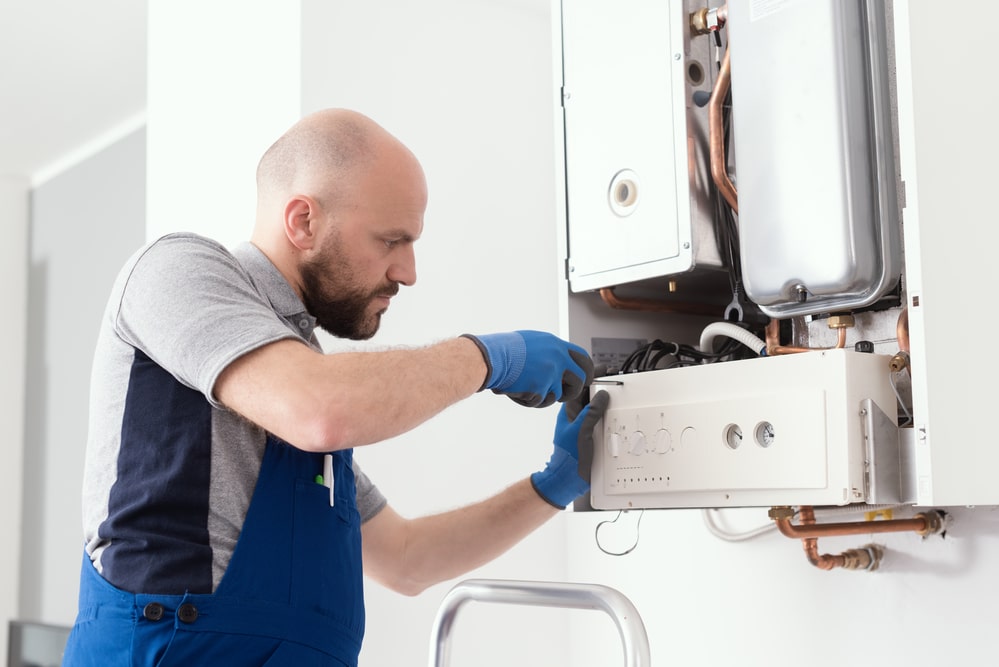
Professional boiler service: qualified technician checking a natural gas boiler at home
Gas Hot Water Heater Not Working Properly? Here’s 7 Signs To Look For
Being able to identify when your gas water heater is failing is crucial to avoid unexpected cold showers and potentially high repair costs.
Early detection of problems can save you from inconvenience and ensure your home remains a comfortable place. The signs that your gas water heater is not functioning correctly can range from obvious to subtle.
Below are seven key indicators to watch out for, each signaling that your gas water heater might be experiencing trouble.
1. No Hot Water or Inadequate Hot Water
The first and most noticeable sign is a stark absence of hot water or it not reaching the desired temperature.
When turning on the hot water tap results in a cold water stream or lukewarm shower, it’s a clear indication that your heating system may be failing.
Plausible Causes:
- Pilot Light Problems: If the pilot light is out, the burner can’t ignite, causing a halt in heating. This can be due to a faulty thermocouple or a simple draft that blew the flame out.
- Gas Supply Issues: A disruption in the gas supply, which could range from a gas control valve not being fully opened to wider gas line issues, will not allow the system to heat the water.
- Thermostat Failure: The thermostat in your water heater may malfunction, leading to inaccurate temperature readings and improper heating control. This could be due to a faulty heating element or something to due with the circuit breaker.
Troubleshooting:
- Check the Pilot Light: Follow the manufacturer’s instructions to relight the pilot light if it appears to be out.
- Gas Supply Inspection: Ensure that the gas shut-off valve is fully open and the gas lines are not damaged.
- Thermostat Adjustment: Verify if the thermostat is set to the correct temperature. You might want to increase it slightly and wait a couple of hours to see if the water gets warmer.
2. Strange Noises
Water heaters tend to make some noise, but loud pops, cracks, or bangs can be unsettling and a cause for concern.
Such noises can indicate mineral build-up within the tank, which turns into a thick sediment that can trap water and overheat, causing the tank to crack or break.
Plausible Causes:
- Sediment Build-Up: Over time, hard water can lead to sediment build-up at the bottom of the tank. This sediment overheats and eventually hardens making the drain pipe and drain valve not work properly.
- Contraction and Expansion: The metal tank will expand and contract as it heats and cools, possibly leading to the formation of minute cracks.
Troubleshooting:
- Regular Flushing: Maintaining a routine of draining a gallon of water from the water heater once every three months can significantly reduce sediment build-up.
3. Foul Odor in the Water
No one likes taking a shower or washing their hands with water that smells like rotten eggs.
If your hot water carries this unpleasant odor, it’s most likely from a bacteria reacting with the magnesium and aluminum found in most anode rods.
Plausible Cause:
- Bacterial Growth in the Tank: Warm and wet environments are ideal for bacteria, including the anode rod in your water heater. This can lead to the production of hydrogen sulfide, the gas that gives off the characteristic smell.
Troubleshooting:
- Temporary Relief: Altering the temperature and flushing out the tank can provide temporary relief by disturbing the bacteria’s environment.
- Anode Rod Replacement: Consider replacing the anode rod with an aluminum or zinc-alloy model if the odor persists after flushing.
4. Water Leak Around the Unit
Discovering a pool of water around your water heater is an alarming but unmistakable sign of a problem.
Leaks can stem from a variety of issues, some of which are easier to fix than others. A leaking water heater needs to be fixed immediately.
Plausible Causes:
- Temperature and Pressure (T&P) Relief Valve Leaks: If the T&P valve is malfunctioning, this critical safety feature may be discharging water at all times. A faulty gas valve of any kind, even a pressure relief valve is an emergency plumbing issue.
- Internal Tank Leaks: Older tanks that have corroded might develop a fissure, and this often means it’s time for a new water heater.
- Inflow and Outflow Connection Leaks: The water heater’s piping and connections can degrade over time, leading to leaks.
Troubleshooting:
- Inspect the T&P Valve: The valve should be allowed to trip once a year during T&P valve testing. Ensure there is no debris lodged in it and it’s properly seated.
- Check Connections: Tighten any visible connections that might be loose and susceptible to leaks.
- Rusty Tank Inspection: A leaking and rusty tank around the base frequently means it’s time for a replacement.
5. High-Pitched or Whining Noise
A high-pitched noise coming from your gas water heater can signal that the burner is struggling to light.
This could point to a more innocuous issue like a defective solenoid valve or a more serious concern like a gas leak.
Plausible Causes:
- Pilot or Main Burner Issues: A water heater that’s not igniting properly can produce this sound. Ignition problems are usually the result of a defect with the pilot assembly, thermocouple, or gas valve.
- Restriction of Gas or Airflow: High-pitched noise can indicate a lack of proper airflow or gas pressure, which can be dangerous and lead to inefficiencies.
Troubleshooting:
- Consult a Professional: For any issues with the gas supply or pilot light, it’s safest to call a professional.
6. Water Takes Longer to Reheat
An increase in the time it takes for your water heater to recover after hot water has been used is a more subtle but no less significant sign that your gas water heater is struggling to keep up.
Plausible Causes:
- Old Age and Wear: Vastly reduced heating capacity may indicate the end of a water heater’s life span, and the unit may need replacing.
- Thermostat Settings and Positions: If the thermostat isn’t working correctly, it can lead to heating problems and long reheat times.
Troubleshooting:
- Check the Thermostat: Over time, thermostats can drift from the set temperature. Adjust it to see if the reheat time improves.
7. Pilot Light Keeps Going Out
A flickering or recurring extinguishing of the pilot light means your water heater is unable to heat the water.
This issue is not just an inconvenience; it could be a sign of significant problems.
Plausible Causes:
- Thermocouple Issues: If the thermocouple isn’t detecting the pilot light, it will shut off the gas supply as a safety measure to prevent gas buildup and potential explosions.
- Drafts and Venting Issues: If there’s not enough air for the pilot light to breathe, it will go out. Ensure vents and pipes are clear of debris.
Troubleshooting:
- Relight the Pilot Light: Follow the manufacturer’s instructions to relight your pilot light, and if it keeps going out, consider it a sign of a more serious issue.
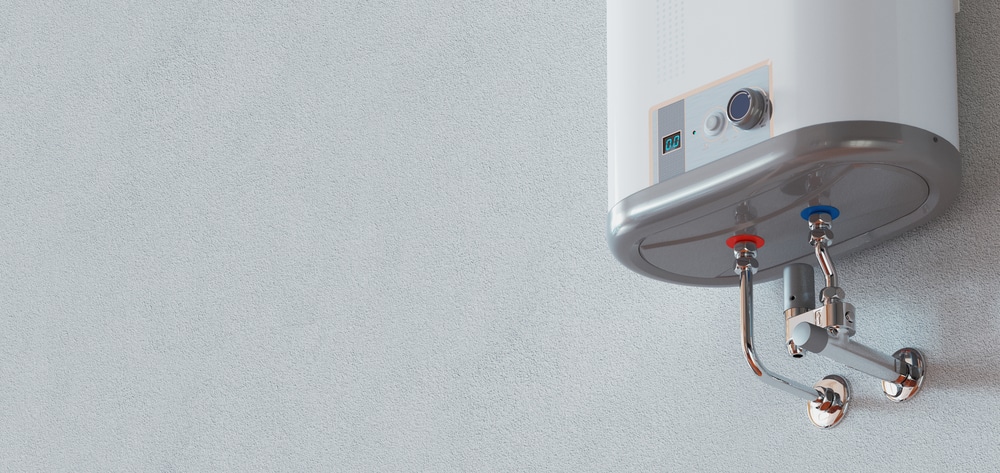
House heating concept – modern home gas fired boiler – energy and cash savings, 3d rendering
When to Call a Professional
While some issues can be simple to address with a bit of time and know-how, gas water heaters are potentially dangerous appliances. Any problems with the gas supply, ventilation, or electrical connections should be handled by a professional.
It’s also important to remember that regular maintenance by a qualified technician can prevent many of these issues from occurring in the first place. If you need a professional plumber, reach out to us at Maryland Sewer and Plumbing.
Maintenance Tips to Keep Your Water Heater in Shape
- Regular Checkups: Schedule an annual maintenance service with a licensed technician to ensure all components are in working order.
- Temperature Checks: Regularly test the water temperature and pressure relief valve to ensure proper functioning.
- Anode Rod Inspection: Periodically inspect and replace the anode rod if it shows significant wear and tear.
- Keep It Clear: Ensure the area around your water heater is clear of debris and is well-ventilated to prevent overheating and allow for safe operation.
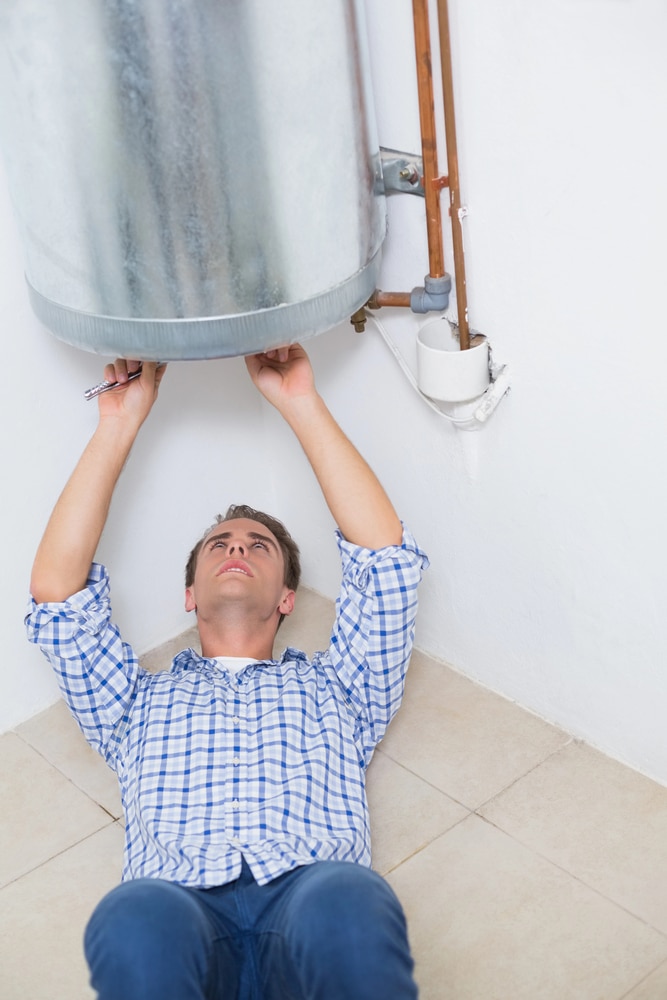
Gas Water Heater Not Working? It’s Time To Fix It!
A malfunctioning gas water heater can quickly turn into a major inconvenience or hazard for your home. By staying vigilant for these seven warning signs and taking the appropriate troubleshooting steps, you can help prevent an unexpected loss of hot water.
Remember, your water heater is more than a convenience; it’s an essential part of keeping your daily routine running smoothly.
Investing time in its care and maintenance ensures reliable hot water for years to come, giving you peace of mind and a comfortable home.

